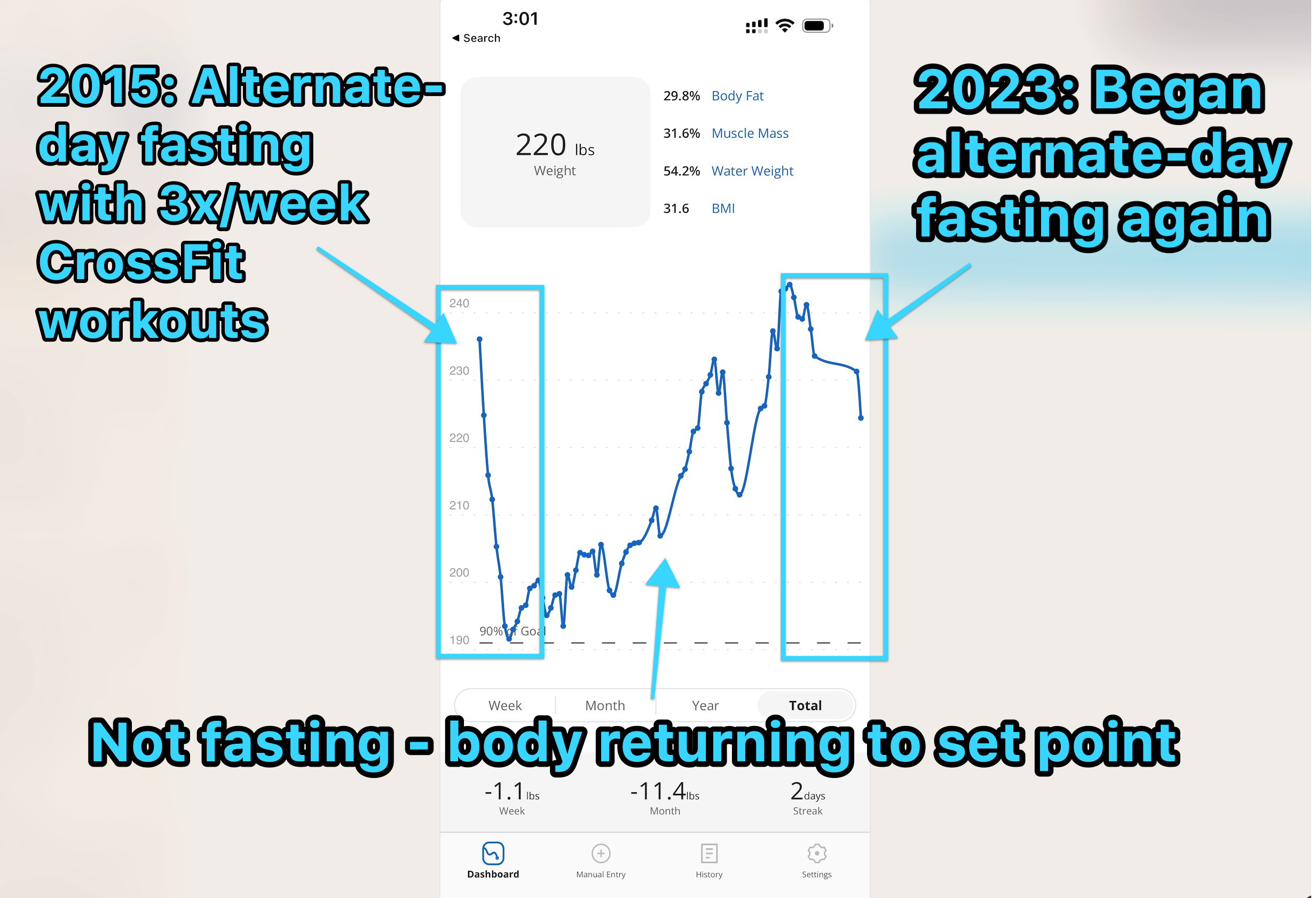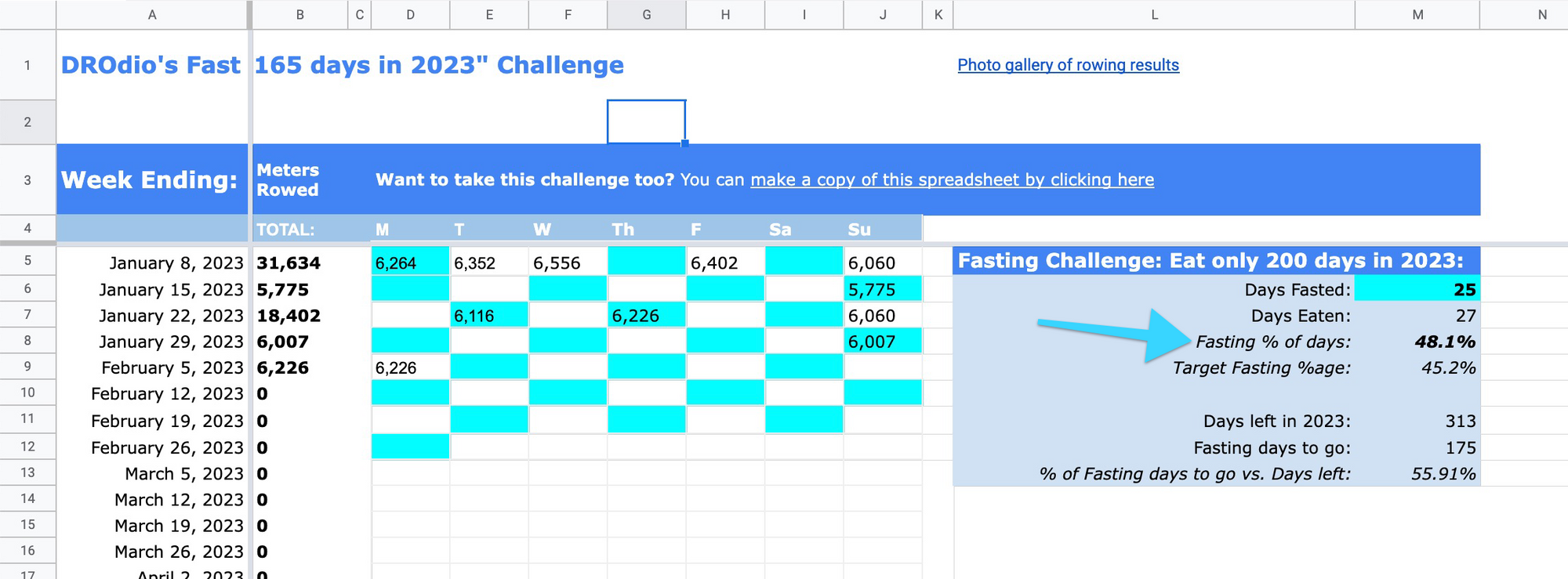Fasting 165 Days in 2023: Back In The Driver's Seat

I've written a lot about fasting, ketosis and health. Yet I still feel like I'm just learning about fasting, how it affects my health, and what it means for my ability to be in the driver's seat of my body.
When I'm not fasting, I feel like I'm a passenger in my own body. I'm not the one making the decisions about what I eat. There's recent science that the body has a "set point" weight that it wants to be at. This resonates with me – my body's set point weight is 240 lbs. The problem is that my logical mind's target weight is 180 lbs. From this NYTimes article:
The root of the problem is not willpower but neuroscience. Metabolic suppression is one of several powerful tools that the brain uses to keep the body within a certain weight range, called the set point. The range, which varies from person to person, is determined by genes and life experience. When dieters’ weight drops below it, they not only burn fewer calories but also produce more hunger-inducing hormones and find eating more rewarding.
The brain’s weight-regulation system considers your set point to be the correct weight for you, whether or not your doctor agrees.
Getting back in the Driver's Seat
I did a lot of fasting between 2015-2018. I did alternate-day intermittent fasting. I did 8-hour window fasting (also called LeanGains). I tried only eating one meal a day. I tried only eating on weekends, fasting M-F for three months.
Fasting is hard, but as the CrossFit saying goes: "It doesn't get any easier, but you do get better at it." And that's true – the more I fast, the more keto-adapted my body feels, and the more easily I slip in and out of a fasted state.
What I know for sure is that when I'm not fasting, I'm not in the driver's seat. Here's a graph that's hard to share, showing my body in control:

In 2023, I decided that I would fast about every other day: I would split the year 50/50, give myself a few extra days, and fast for 165 days, eating for 200.
Being almost two months in, I feel like I'm back in the driver's seat. I've fasted 25 days and eaten 27 days so far in 2023, and it feels great. It's not easy, but it's immensely rewarding. Here's a chart of my fasting days (the numbers are meters rowed).

Is this bad for me?
I'd love to know the answer to this question. It definitely doesn't feel bad. If anything, there's a body of scientific research about fasting that seems beyond belief. I've referenced some of the articles below. I'd love to hear from more medical professionals about whether or not doing a continuous alternate-day-fast for a year is a tremendously healthful or tremendously unhealthy goal.
Here's some of the literature I've found:
Slowing aging. Improving molecular markers. Promoting stem-cell-based regeneration of damaged immune system. Reversing immunosuppression. Improved cardiovascular health. How can this research be true? And yet it's from reputable sources like the New England Journal of Medicine. Is this not better known because there's nothing to sell, here? Just mind-boggling how positive the research is on fasting, and yet how few of us really know about it.
- Diet that mimics fasting appears to slow aging: This study by Valter Longo and his team found that a periodic fasting-mimicking diet can reduce visceral belly fat, improve learning and memory, and potentially extend life span, with promising results in mice and a pilot study in humans. (Here's the Storytell report summary)
- Effects of Intermittent Fasting on Health, Aging, and Disease: Intermittent fasting is a dietary pattern that has been found to have numerous health benefits, including improved metabolism, inflammation, cardiovascular health, brain health, cancer, and longevity, and is an effective way to lose weight and improve overall health. (Here's the Storytell report summary)
- Alternate Day Fasting Improves Physiological and Molecular Markers of Aging in Healthy, Non-obese Humans: This study found that a 4-week strict Alternate Day Fasting (ADF) intervention was associated with improved fat distribution, cardiovascular health, and lowered levels of triiodothyronine in healthy, non-obese adults, without any significant changes in insulin sensitivity or resting energy expenditure. (Here's the Storytell report summary)
- Prolonged fasting reduces IGF-1/PKA to promote hematopoietic-stem-cell-based regeneration and reverse immunosuppression: This article reviews recent research on the role of lysosomes in regulating the metabolism of hematopoietic stem cells, as well as the potential benefits of dietary interventions such as fasting and time-restricted eating, in order to better understand how hormones, growth factors, and hematopoiesis affect the body's growth and development. (Here's the Storytell report summary)
- Fasting triggers stem cell regeneration of damaged, old immune system: This study has uncovered a natural intervention of prolonged fasting which can trigger stem cell-based regeneration of an organ or system, potentially leading to clinical applications that could rejuvenate the immune system. (Here's the Storytell report summary)
- Prolonged Fasting Reduces IGF-1/PKA to Promote Hematopoietic-Stem-Cell-Based Regeneration and Reverse Immunosuppression: This study examines the effects of Prolonged Fasting (PF) on stem cell stress resistance, self-renewal, and pluripotency maintenance, finding that PF cycles downregulate IGF-1 and PKA to promote stem cell self-renewal, reduce DNA damage, increase peripheral blood counts, and enhance competitive repopulation and cell genesis. (Here's the Storytell report summary)
- Effects of short-term fasting on cancer treatment: This review provides an overview of the potential benefits of short-term fasting (STF) during cancer treatment, discussing its effects on toxicity, efficacy and quality of life, as well as its safety and feasibility in clinical practice. (Here's the Storytell report summary)
- Intermittent fasting from dawn to sunset for four consecutive weeks induces anticancer serum proteome response and improves metabolic syndrome: This study evaluated the potential of body mass index (BMI) to predict colorectal cancer risk, and developed personalized clinical strategies for prevention, such as intermittent fasting from dawn to sunset. (Here's the Storytell report summary)
- Intermittent fasting from dawn to sunset for four consecutive weeks induces anticancer serum proteome response and improves metabolic syndrome: This study evaluated the potential of body mass index (BMI) to predict colorectal cancer risk, and developed personalized clinical strategies for prevention, such as intermittent fasting from dawn to sunset. (Here's the Storytell report summary)
I'd have to do this for the rest of my life
Fasting every other day is feeling great so far in 2023. But I know what awaits me if I stop doing it – because for five years I stopped and my body went right back up to its set point weight. So I know that if I want to stay in control of my body, I'll need to keep up some type of fasting schedule for the rest of my life. It feels daunting to be fighting my body's natural inclination, but not unachievable. I'll let you know how it goes.
Thank you Storytell.ai for producing excellent summaries of the very dense medical literature above, and making it much more accessable! 🙏